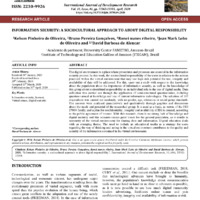INFORMATION SECURITY: A SOCIOCULTURAL APPROACH TO ABOUT DIGITAL RESPONSIBILITY
Item
-
Tipo do ITEM
-
Artigo Ciêntifico
-
Título do Artigo
-
INFORMATION SECURITY: A SOCIOCULTURAL APPROACH TO ABOUT DIGITAL RESPONSIBILITY
-
Descrição
-
The digital environment is a place where procedures and processes are essential in the information
security process. In this work, the sociocultural responsibility of the users in relation to the actions
practiced within the virtual environment that may use high risk potential for use, integrity and
availability of data will be addressed. For this, carry out a study with respect to the knowledge
about the population about the importance of information security, as well as the knowledge of
this group about sociocultural responsibility as an individual role in the use of digital media. Data
collection was carried out through the application of semi-structured questionnaires, including
questions aimed at knowledge and use of current information technologies. The selection of 112
respondents was carried out randomly, with no gender, age, education or social group standards.
The answers were analyzed quantitatively and qualitatively through graphics and discussions
about the needs and potential of the researched group. It is used as a basis, as norms of the ISO
27000 family, and a plan for confidentiality, integrity and availability (CID) is created, according
to the public agreement of interest. With this research, there is no strong lack of knowledge and
digital maturity and this scenario causes great losses for the general population, as it results in
insecurity of the virtual environment for sharing data and information. Digital education deals
with an emerging theme. The need to include an educational media as a strategy for users
regarding the way of thinking and acting in the virtual environme
Key Words:
Information security, Internet,
Virtual crimes, Digital maturity
-
Abstract
-
The digital environment is a place where procedures and processes are essential in the information
security process. In this work, the sociocultural responsibility of the users in relation to the actions
practiced within the virtual environment that may use high risk potential for use, integrity and
availability of data will be addressed. For this, carry out a study with respect to the knowledge
about the population about the importance of information security, as well as the knowledge of
this group about sociocultural responsibility as an individual role in the use of digital media. Data
collection was carried out through the application of semi-structured questionnaires, including
questions aimed at knowledge and use of current information technologies. The selection of 112
respondents was carried out randomly, with no gender, age, education or social group standards.
The answers were analyzed quantitatively and qualitatively through graphics and discussions
about the needs and potential of the researched group. It is used as a basis, as norms of the ISO
27000 family, and a plan for confidentiality, integrity and availability (CID) is created, according
to the public agreement of interest. With this research, there is no strong lack of knowledge and
digital maturity and this scenario causes great losses for the general population, as it results in
insecurity of the virtual environment for sharing data and information. Digital education deals
with an emerging theme. The need to include an educational media as a strategy for users
regarding the way of thinking and acting in the virtual environme
Key Words:
Information security, Internet,
Virtual crimes, Digital maturity
-
Língua do arquivo
-
inglês
-
Data da Publicação
-
Ano 2020
-
Palavra-chave
-
Information security
-
Internet
-
Virtual crimes
-
Digital maturity
-
Autores
-
Kelson Pinheiro de Oliveira
-
Bruno Pereira Gonçalves
-
Ronei nunes ribeiro
-
Jean Mark Lobo de Oliveira
-
David Barbosa de Alencar
-
Local
-
ITEGAM - Manaus, 2020


